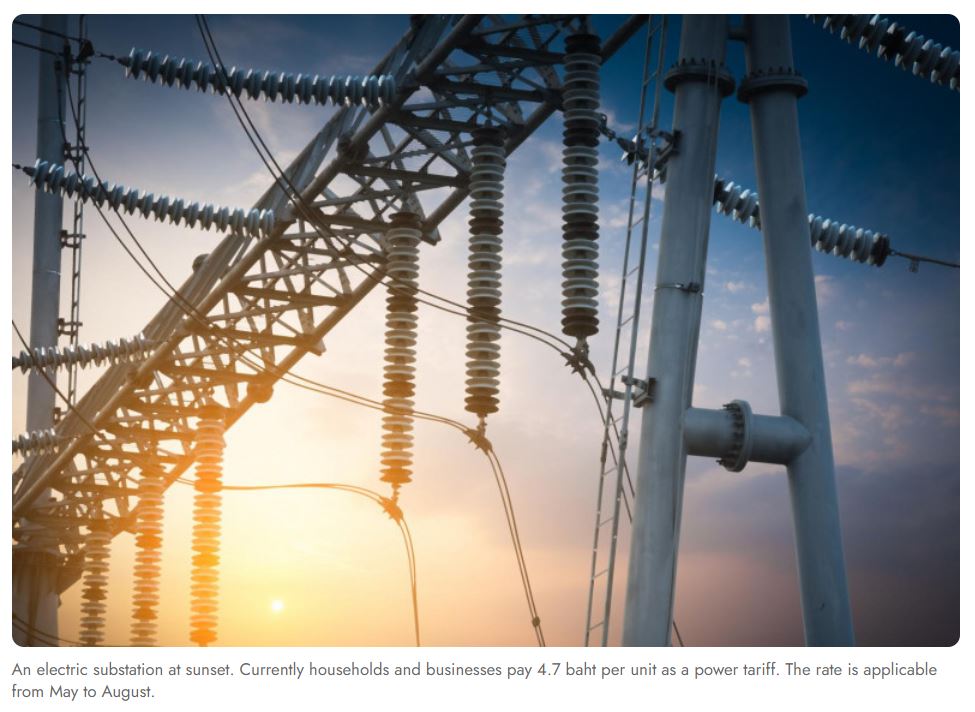Thailand: Behind the power tariff decision
A lower power tariff scheduled to take effect from Sept 1 not only means cheaper electricity bills for households and businesses during the last four months of this year, but also helps the debt-ridden Electricity Generating Authority of Thailand (Egat) with its plan to settle its debt.
The Explainer examines the new power tariff, which is largely based on gas prices, and why Egat is involved in determining the rates.
The tariff rates, despite decreasing since May, are causing an increase in installation of rooftop solar panels among households and state agencies.
Q: Is the new power tariff the lowest for this year?
If the rate recently approved by the Energy Regulatory Commission (ERC) stands at 4.45 baht per kilowatt-hour (unit), it would be the lowest tariff for 2023.
The rate was less than 4 baht before the prices of liquefied natural gas (LNG) soared last year, following the Russian invasion of Ukraine.
Natural gas is the main fuel used for electricity generation in Thailand.
Households and businesses currently pay 4.7 baht per unit, applicable from May to August.
During the first four months of this year, businesses paid 5.33 baht per unit, up 13% from the previous record high of 4.72 baht per unit, while households paid 4.72 baht per unit.
The ERC resolved in late July to reduce the power tariff by 5.3% to 4.45 baht per unit after seeking public opinion on three choices of new power tariff rates from July 7-21.
The 4.45 rate was the lowest among the three options, which comprised 6.28 and 4.7 baht per unit.
The ERC opted for the lowest rate partly because of a drop in gas prices, which are used to calculate the fuel tariff, or Ft, which is a key component of the power tariff.
According to the regulator, the calculation of the three power tariff options was based on a decrease in the average price of the gas pool by 53% to 346 baht per million British thermal units from the May-August cycle.
The gas pool price is calculated based on the price of gas supplied from the Gulf of Thailand and Myanmar, as well as imported LNG.
Prices of imported LNG and coal declined, while Thailand expects to have a greater supply of inexpensive domestic gas, the ERC said earlier.
Under the new rate of 4.45 baht a unit, the Ft is reduced by 26% to 0.66 baht per unit, down from 0.91 baht per unit in the May-August cycle, according to Khomgrich Tantravanich, secretary-general of the ERC.
Q: Why does Egat have a say in the new power tariff?
The choice of the new power tariff is based not only on gas prices and public opinion, but also Egat recommendations because a portion of electricity bills are used to reimburse the authority.
In setting the new rate, the ERC considered varying periods to pay back Egat, which accrued a large loss after subsidising electricity bills from September 2021 to May 2023.
The loss is projected to decrease to 135 billion baht at the end of this month, according to the regulator.
Egat could settle its loss in less time if a higher tariff rate was chosen. The 6.28-baht rate would allow the authority to clear its debt by December of this year, while the 4.7-baht tariff would wipe out the debt by September 2024.
During his latest media interview last week, Boonyanit Wongrukmit, the Egat governor, said the authority does not agree with proposals to cut the power tariff from 4.45 baht per unit, as this would affect its future investment in the power infrastructure.
He said extending the payback period will affect Egat’s cash flow and credit rating, which could lead to higher loan rates. This would be a hindrance to the authority’s investment in power transmission expansion, eventually affecting energy security in the long term, said Mr Boonyanit.
Q: Could solar energy help decrease electricity bills?
Solar energy makes users less dependent on the state grid, meaning they pay less for power bills. Though the power tariff is decreasing next month, households, businesses and state agencies are considering installing rooftop solar panels to better deal with fluctuations in electricity prices.
The Department of Medical Services, which oversees more than 30 hospitals nationwide, is interested in this clean energy.
The department signed a memorandum of understanding with Energy Absolute Plc (EA), a renewable energy and electric vehicle developer and operator, to jointly study and develop a plan to install rooftop solar panels at a pilot hospital.
The department also plans to use an energy storage system to ensure a steady supply of renewable energy if the solar modules are unable to generate sufficient electricity.
Amorn Sapthaweekul, deputy chief executive of EA, said earlier the company and the department are in the process of selecting the pilot hospital for the project.
Clean energy is gaining attention from state agencies after the cabinet resolved on March 22 last year to encourage agencies to reduce electricity and oil usage by 20%, in part by considering the installation rooftop solar panels in cooperation with the business sector.
Source: https://www.bangkokpost.com/business/general/2626143/behind-the-power-tariff-decision


 Thailand
Thailand




